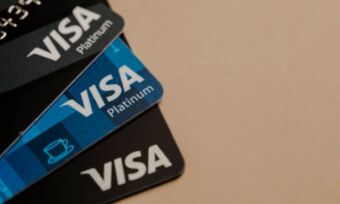Can you earn reward points from paying bills?
There are a number of different rewards credit cards on the market that will award you points for spending money when paying bills like your groceries, mortgage repayments, rent, insurance premiums, utilities, subscriptions and gym membership. This is as long as the spending is considered eligible by your credit card provider (see below for a trick to get around this).
Rewards points can be used in a number of different ways, and can be of particular interest to the holiday seekers. They can often be converted into frequent flyer points with your airline rewards program of choice. Some credit cards even allow you to earn frequent flyer points directly by spending.
Bills tend to be unavoidable, and have to be paid one way or another, so if you would typically pay them with a debit card, you may find that you could instead earn rewards by paying with your credit card. Over time, you could find that you accumulate enough of these points to put towards a flight, or a seat upgrade from economy to business class. In this way, if you use your card smartly, your bills could turn into a nice little trip away.
You can compare rewards credit cards with Canstar. It’s important to read any relevant documentation, such as the Product Disclosure Statement (PDS), Target Market Determination (TMD) and Key Facts Sheet, for any credit card product you’re considering.
- 0% p.a. for 26 months on balance transfers plus $0 annual fee in first year.* 3% balance transfer fee applies.
Australian Credit Licence 234527
- 0% BT for 24 months*. 3% BT fee applies. New customers only, must be approved by March 31 2026.
Australian Credit Licence 392145
- Fill your shopping trolley with a $250 Coles gift card when you apply for a new Coles Rewards Mastercard by 17 March 2026. T&Cs apply.
Australian Credit Licence 230686
- $0 annual fee 1st year (normally $96) & earn up to $500 in Latitude Rewards in yr 1. Min spend on eligible purchases applies. New approved customers by 26 Feb 2026
Australian Credit Licence 392145
- 0% p.a. for 10 months on balance transfers (1% fee)
- Award winning no annual fee rewards credit card
- Complimentary FIRST membership valued at $129/year
Australian Credit Licence 230686
- 0% p.a. for 24 months on balance transfers.
- Free overseas travel insurance. No FX fees.
- 3% BT Fee. Ltd time, other fees, T&Cs apply.
Australian Credit Licence 234945
- $300 credit back. Spend $1.5K+ p/m on general purchases in 1st 4 months. T&Cs, mthly credit card fee $10.95 & other charges apply, new customers approved by 31Mar26
Australian Credit Licence 392145
Australian Credit Licence 234527
Australian Credit Licence 234527
Australian Credit Licence 234945
Australian Credit Licence 392145
Australian Credit Licence 392145
My credit card provider has restrictions on earning points for paying bills. How can I get around this?
Whether you can use your credit card to earn points on bill payments will depend on what your credit card provider considers an “eligible purchase” to be. Many providers tend to exclude government, utility and BPAY bill payments for points-earning, for instance. This includes blocking points on tax payments directly to the Australian Taxation Office (ATO). So it’s a good idea to check the terms and conditions of your rewards credit card before using it to earn points on bills.
There are ways to get around this problem, however. The hack to still earn points for paying bills that may typically be excluded, like paying tax in Australia, is to use bill payment services which tend to allow you to pay almost any business, including government bodies.
Some of these services include B2Bpay, RewardPay and Sniip, but there are many available in Australia. They typically come with fees attached, which may differ depending on whether payments are made with Visa, Mastercard or American Express. It’s worth taking a hard look at the fee structure combined with any fees you already pay on your rewards credit card before using one of these services.
What can you do with your rewards points?
If you’re considering a rewards credit card, think about whether you’ll spend enough on the card to make it worthwhile, while ensuring you’ll make your repayments on time. According to Canstar Research, the average annual fee for a credit card on Canstar’s database is $164, so the reward points you earn would need to counterbalance this, at a minimum, to be worthwhile.
Now let’s consider what you can actually do with your points. Say you’re keen to take a flight between capital cities, and you want to upgrade your economy seat to a business class one. How many points would you need to use for an upgrade, and how much would you need to spend to actually earn those points?
At the time of writing, the two highest earning frequent flyer credit cards on Canstar’s database are the American Express Velocity Platinum Card and the American Express Qantas Ultimate Card. Both these cards earn 1.25 airline reward points for each dollar you spend on eligible purchases, excluding those made at government bodies (such as paying bills from the Australian Taxation Office), for which you earn 0.5 reward points per dollar spent.
Say you were keen to take a flight from Brisbane to Perth, and you’d like to upgrade to business class seats to make the journey a little more comfy. Qantas says that, right now, it would cost you approximately 13,100 Qantas Points to upgrade to business class on a Flexible Economy fare. Virgin, on the other hand, says that an equivalent upgrade would cost you 30,000 Velocity Points.
Based on the most up to date information available, you would need to make $10,480 worth of eligible purchases with an American Express Qantas Ultimate Card or $24,000 with an American Express Velocity Platinum Card to earn the points necessary for an upgrade like this.
Many credit card rewards programs offer points that do not expire, and others expire after a set period of time, for example 36 months. You’ll need to check the terms and conditions of your individual card to find out where you stand, but irrespective, if you think you’ll be able to bank up this many points with continuous use of your card, then this type of upgrade could be within reach now and then.
As long as you’re able to pay the balance of your card off in time to avoid interest charges—which can be 20% p.a. or higher with rewards credit cards—then a business class upgrade could be a nice little bonus. If you’re thinking about turning bills into reward points, however, there are a number of important things to keep in mind, to make sure the benefits of this strategy outweigh the potential costs.
What do you need to be wary of?
Some key things to watch out for when using a rewards credit card to pay your bills are:
Interest rates
Rewards cards that allow you to earn points typically come with higher interest rates than other types of cards. This means if you don’t make repayments in full during the interest-free period, you could find yourself facing expensive interest charges. If you’re the type of borrower to carry a balance on your card from statement to statement, then a rewards credit card may not be suitable for you.
Annual fees
Rewards credit cards typically have high annual fees, and depending on the kind of card you have and how much you’re spending, you may find that the value of points you earn is cancelled out by the fee. Some rewards cards can come with fees of $1,000 or more annually, and while not all fees are this high, they’re still an important element to keep in mind.
Surcharges
If you’re planning on paying a bill with a credit card, it’s important to work out if you’ll face a surcharge. Some providers may charge a fee if you pay bills with a credit card, and this amount can be calculated based on the amount of the bill. This means that you could end up paying more for a bill than expected when the surcharge is factored in, and the points you could earn for paying with your credit card may not make up the difference.
Certain credit card surcharges, however, may become a thing of the past, as the Reserve Bank of Australia (RBA) has proposed a ban on Eftpos, Mastercard and Visa card surcharges from July 2026.
Interest-free periods
Some credit cards offer interest-free days, but it’s important to be aware of how these actually work, in order to avoid being hit with interest charges. While you may assume this period starts at the date you make a purchase, it typically starts from the beginning of a statement cycle. This can mean you can get caught out paying unexpected interest charges on a rewards credit card.
Cash advances
One thing to be particularly wary of when it comes to paying bills with a credit card is whether the bills you’re paying are classified as cash advances by your credit card provider—effectively, as if you had used your credit card to withdraw cash. Cash advances usually incur an additional fee, which can be a flat dollar amount or a percentage of the transaction. While it’s unlikely that a bill will be classified as a cash advance, it still pays to check, because if a bill is classified in this way, you’ll accumulate interest from day one.








